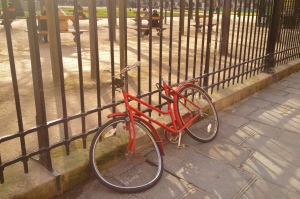 When a book seems to be everywhere, gaining critical and commercial attention, I do my best to avoid reading reviews. I aim to remain as neutral as possible and even ignorant of the book's premise so I can read with an unbiased mind. So it was with The Fault In Our Stars. It wasn't until I had it home from the library, reading the jacket summary, did I know it was a young adult novel with cancer as a central cast member.
When a book seems to be everywhere, gaining critical and commercial attention, I do my best to avoid reading reviews. I aim to remain as neutral as possible and even ignorant of the book's premise so I can read with an unbiased mind. So it was with The Fault In Our Stars. It wasn't until I had it home from the library, reading the jacket summary, did I know it was a young adult novel with cancer as a central cast member.
When a book touches me in a certain way, I seek out negative reviews before writing my own thoughts. I wonder if my emotional reactions have clouded my critical assessment and I look for counter opinions to balance my perspective.
I read through several less-than-enthusiastic Goodreads reviews of The Fault In Our Stars, appreciating some comments, shaking my head at others - as we do in that community. But one review and the intense debate/discussion that accompanied it troubled me greatly. The reviewer, while recognizing the quality of Green's writing, questioned the right the author had to tell the story. Presumably because he had not lost a loved one to cancer, although the book was predicated on Green's experiences as a chaplain at a children's hospital.
What troubled me about this review was the questioning of an author's right to tell a story that he or she had not experienced directly. This is a work of fiction. This is what writers do. Of course many writers fictionalize events in their life, using their experiences as jumping off points for stories, as Green did. But the notion that a writer must restrict his storytelling to first-hand events is preposterous. Should Martin Zusack not have written The Book Thief? Should Cormac McCarthy not have written Blood Meridian? Should China Miéville not construct his steampunk fantasy worlds? Should Shakespeare not have written Hamlet? Okay, you get my point.
John Green wrote a deeply personal and very contemporary story from the first person perspective of a young woman dying of cancer. No, the author has never been a sixteen year old girl with a terminal illness. But he gave voice to her tragedy in a way that has touched thousands of readers. It's is what we trust writers to do: to tell the stories we know, can imagine, or want to hear but do not have the ability to voice on our own.
Another criticism of this book that bugged the heck out of me was the charge that of an emotionally manipulative story. This is a young adult novel about kids dying of cancer. If there is a way to write the story that doesn't involve intense emotions, well, it would not be a story I'd care to read. Adolescents and teenagers feel things deeply. On a scale of one to ten, they experience life at twenty. If anything, in a world of instant feedback and frighteningly short attention spans, I am grateful for a book that takes the young adult reader's breath away, that makes them feel truly, madly, deeply.
And yet another poke at The Fault In Our Stars was the hyper-precocity of its characters. It's true. Teenagers aren't this articulate. In fact, no one I know, no matter how widely read and clever, speaks with the rapid-fire wit and clarity of Hazel and Gus. Then again, no one speaks like characters in a David Mamet play, or a Quentin Tarantino movie, or an Aaron Sorkin television drama. Yet we eat that shit up. Because it's great writing and the characters knock us out. I WANT young readers to hear voices like these. Because young readers are smart. They get this dialogue, these characters. Just because they aren't capable of spouting forth with such erudition (who amongst us is?) doesn't mean they aren't capable of examining and responding to life with sophisticated insight. May I remind those critics again that this is a work of fiction?
I wasn't fully on board with the subplot of elusive and misanthropic JD Salinger-esque author and his strange book - those scenes seemed forced and stilted to me - but I would have gone just about anywhere with these characters.
A beautifully rendered tragedy with smart, funny, honorable characters whose voices are unique and strong. I can think of no greater gift to young and mature readers alike than a powerful story told with grace and feeling.















